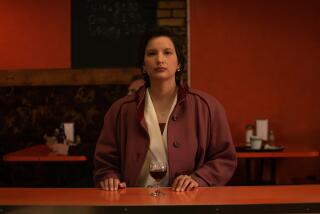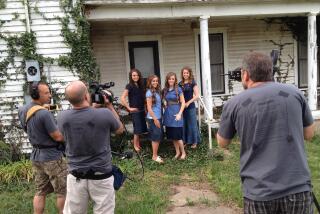Pain of Child Abuse in ‘Little Girl Lost’
- Share via
After viewing tonight’s ABC movie “Little Girl Lost,” you may be unable to look at children without an overwhelming awareness of their vulnerability.
Television often seems to be an endless cycle of sob stories--on whatever subject is hot at the moment--but this devastating film about child abuse (airing at 9 p.m. on Channels 7, 3, 10 and 42) proves that the intimacy of the small screen can be an affecting, gut-level way to explore the human condition.
This fact-based drama, which begins in 1979, is the story of 4-year-old Tella (Marie Martin), who had been placed as a neglected 1-year-old in a loving foster home. When she is 3, she is forced by law to begin visiting her natural father, and the foster parents begin to suspect he is abusing her.
Because there is no positive evidence of abuse, because the state children’s services case worker insists Tella’s terror and claims of mistreatment are manufactured as an attention-getter, her anguished foster parents (Tess Harper and Frederic Forrest) can do nothing to stop the visits.
Ann Beckett’s teleplay, based on a story by Angela Shelley and C. Scott Alsop, directed by Sharron Miller with an exceptional principal cast, is an unsensationalized, finely drawn portrait of a tragedy that could have been prevented.
Harper and Forrest are well-matched as a couple whose uncomplicated, rural life becomes a skewed world of bureaucratic officiousness, incompetence and legal red tape. As two people baffled by a system that refuses to acknowledge a child’s need for protection, they wrenchingly reflect the erosion of their comfortable stability.
One night at bath time, Tella hesitatingly informs her foster mother of her father’s abuse, wondering if it’s because she’s a bad girl. Harper, whose eyes are like windows into her soul, goes completely still. In that one brief moment, we see a world collapse.
Over and over the foster parents are told it is the natural parent who is supported by the law. A 4-year-old who screams when she has to see her father and says he touches her “down there” is legally invisible and voiceless.
Lawyer Derek Strull (William Edward Phipps) tells them that “what it comes down to is two people with no legal rights trying to determine the interests of one with doubtful credibility.” A court appeal goes against them.
They enlist the local media in their two-year fight. Forrest’s best moments are in front of the news cameras when his struggle with natural inarticulateness becomes eloquence. Patricia Kalember sensitively plays the reporter who sees it all as good copy and yet is emotionally involved.
This harrowing story would not be the same without Marie Martin, however. An extraordinary child actress, Martin’s tiny baby face--whether happily absorbed, distorted by fear or passively self-protective--is absolutely convincing. When she clings to Harper, crying and begging to stay with her, it’s like a blow to the solar plexus.
Like ABC’s ground-breaking “Something About Amelia” in 1984, “Little Girl Lost” takes an almost unmentionable issue and translates it into a simple message: No one has the right to victimize a child.
More to Read
The complete guide to home viewing
Get Screen Gab for everything about the TV shows and streaming movies everyone’s talking about.
You may occasionally receive promotional content from the Los Angeles Times.






